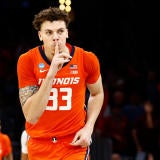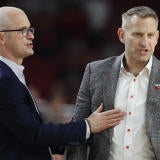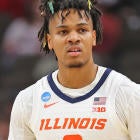In his closing remarks last week on the 26th floor of the Daniel Patrick Moynihan United States Courthouse in lower Manhattan, prosecutor Noah Solowiejczyk told a jury of eight women and four men that "if the universities had known about the defendants' secret payments they never would have issued those scholarships" to the five-star prospects whose guardians accepted them.
Consequently, he said, the universities were defrauded.
Never mind that this notion -- specifically that Kansas and Louisville were the "victims" of crimes committed by Jim Gatto, Merl Code and Christian Dawkins -- flies completely in the face of common sense for anybody who knows how high-stakes college basketball recruiting works. That was the case. And, somewhat surprisingly, at least to me, the jury bought it.
Guilty.
On all counts.
After nearly 20 hours of deliberations spanning three days, a jury on Wednesday afternoon turned two former Adidas executives and a wannabe street-agent into convicted felons. Sentencing is scheduled for March 5. Gatto is reportedly facing around seven years in prison while Code and Dawkins are likely looking at about three. Either way, assuming the appeals that are sure to come are all ultimately denied, each man will someday serve real time in a real prison even though they couldn't have possibly believed they were defrauding anybody back when they did what they admittedly did.
That's what made this trial so fascinating.
Nobody was really arguing about what happened. The only argument was whether Gatto, Code and Dawkins actually defrauded universities when they paid whomever needed to be paid to get certain prospects to enroll where they wanted them to enroll. The prosecution insisted they did because they were knowingly putting universities at risk of NCAA issues by compromising the amateur status of student-athletes. The defense, more or less, countered with some version of "you cannot be serious."
Truth is, anybody familiar with the grassroots scene understands Gatto, Code and Dawkins weren't doing anything the people they were doing things for didn't want them doing. Perhaps it went unsaid, in some instances; plausible deniability can be a college coach's best friend. But Gatto, Code and Dawkins were 100 percent violating NCAA rules to help, not hurt, the schools in question.
I know that. You know that.
To suggest otherwise is silly.
But here's the thing: The jury, by design, wasn't filled with folks who write or read college basketball columns. The jury was instead comprised of 12 people who reportedly know very little about the sport and its inner-workings. So when the prosecution submitted that these universities would've never offered scholarships to prospects if they'd thought for a moment that the prospects were secured in violation of NCAA rules, and therefore the universities were defrauded by the defendants, these 12 people who know very little about the sport and its inner-workings bought it even though the rest of us know universities willingly place student-athletes on scholarships under questionable circumstances all the time.
All. The. Time.
Bottom line, this was a huge win for the prosecution and a life-altering loss for the defendants. I mean, can you imagine doing seven years in prison because you wanted Louisville to compete near the top of the ACC? From that perspective, this is insanity. But, regardless, a precedent has been set, and that precedent is this: If you are a sneaker executive, street-agent, middle-man or anybody else who compromises the amateur status of a prospective student-athlete, you are theoretically committing a federal crime.
That's what a jury just told the world.
I'm not saying that alone will cleanup the sport.
Let's not be naive.
But, if nothing else, it's a new thing that must be considered.





















